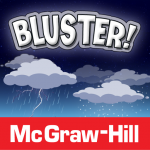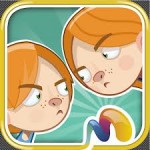Vocabulary develops in two ways
- Number of words
- Depth and scope of vocabulary
More information on vocabulary and its importance can be found here
There are a number of ways that the ipad can be used to develop vocabulary which is critical to language development, comprehension skills and academic success.
One of the most comprehensive vocabulary apps is
Real Vocabulary Pro $19.99
 This app addresses vocabulary at a receptive and expressive level.
This app addresses vocabulary at a receptive and expressive level.
The app targets – Antonyms, Synonyms, Definitions, Multiple Meanings and Idioms. There are three engaging reward games that the child can play when they succeed at a task. This keeps the child motivated to continue playing.
An in depth review of this app can be found here
Real Vocabulary is also available in a lite version for free. You can download it here . The full version is well worth it!
Bluster

Bluster helps students develop vocabulary skills while learning to recognize word patterns. This app addressees antonyms, synonyms, word roots and homophones in an exciting game format. Your child will be required to select the correct group of words before the sun sets.
The Opposites $0.99
The Opposites is an exciting word game which challenges your child (ages 7+) to match up pairs of opposite words before the screen is filled.
Opposites starts with easy word pairs, like ‘up-down’, but as players level up they are challenged with more complex and abstract words.
Factory of Categories $5.99
Categorization is an important skill for the development of new vocabulary and retrieving existing vocabulary. Factory of Categories is an easy to use app that can be used with younger children as well as older ones. You can find a more in depth review of this app here
For a video demonstration of these apps, have a look at iParent
It takes the average student about 25 experiences with a word before they internalize it. Creating multiple opportunities for vocabulary development and enrichment will support their reading comprehension and academic success.





